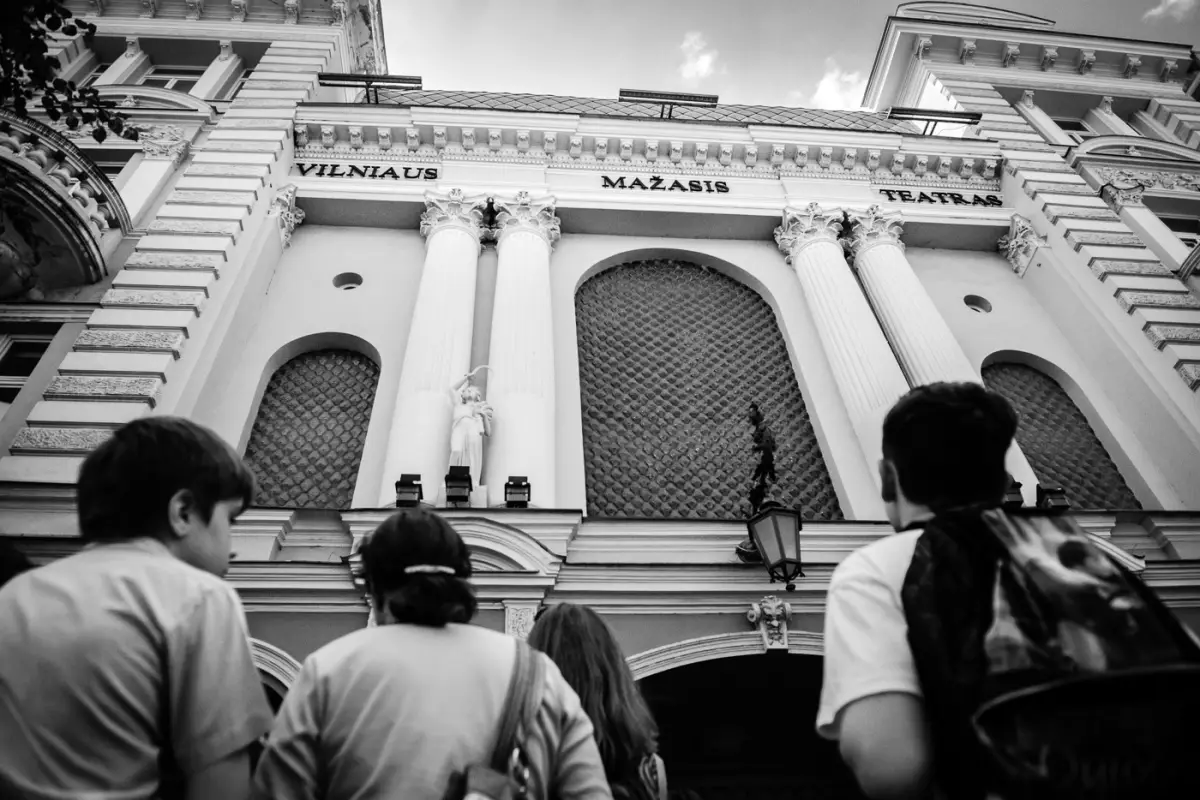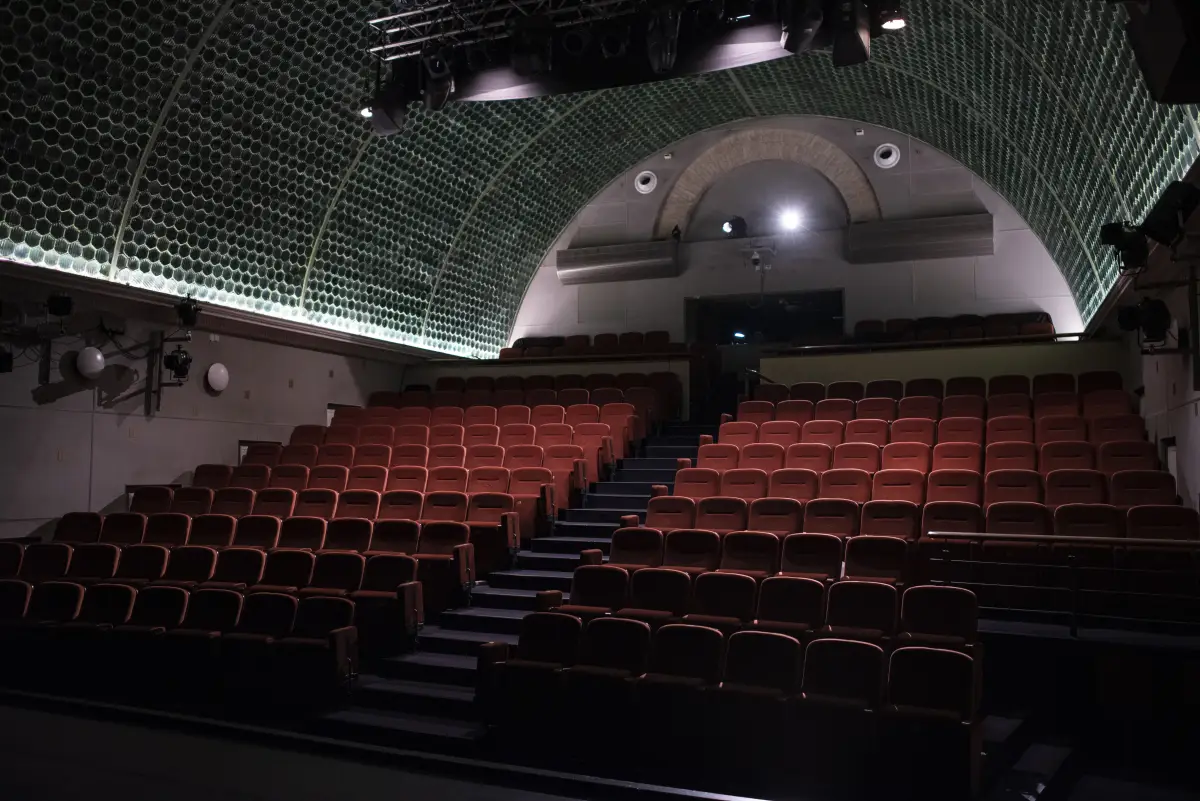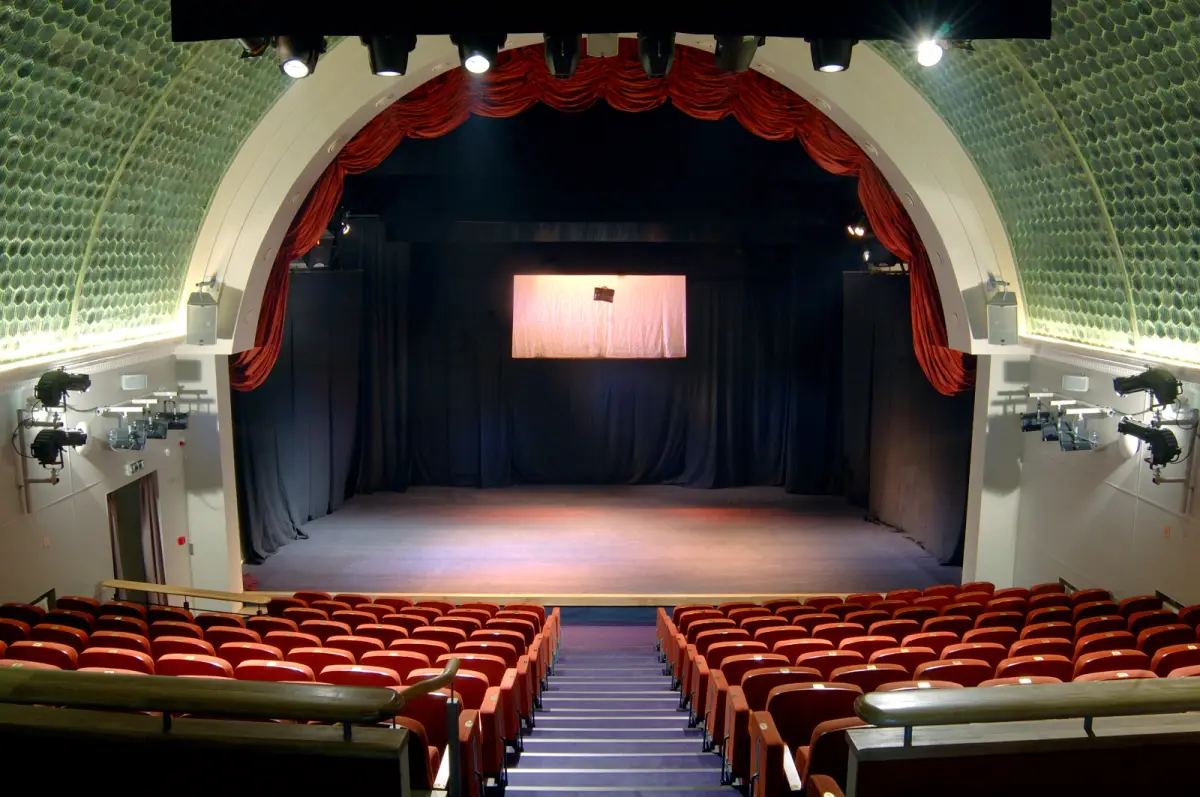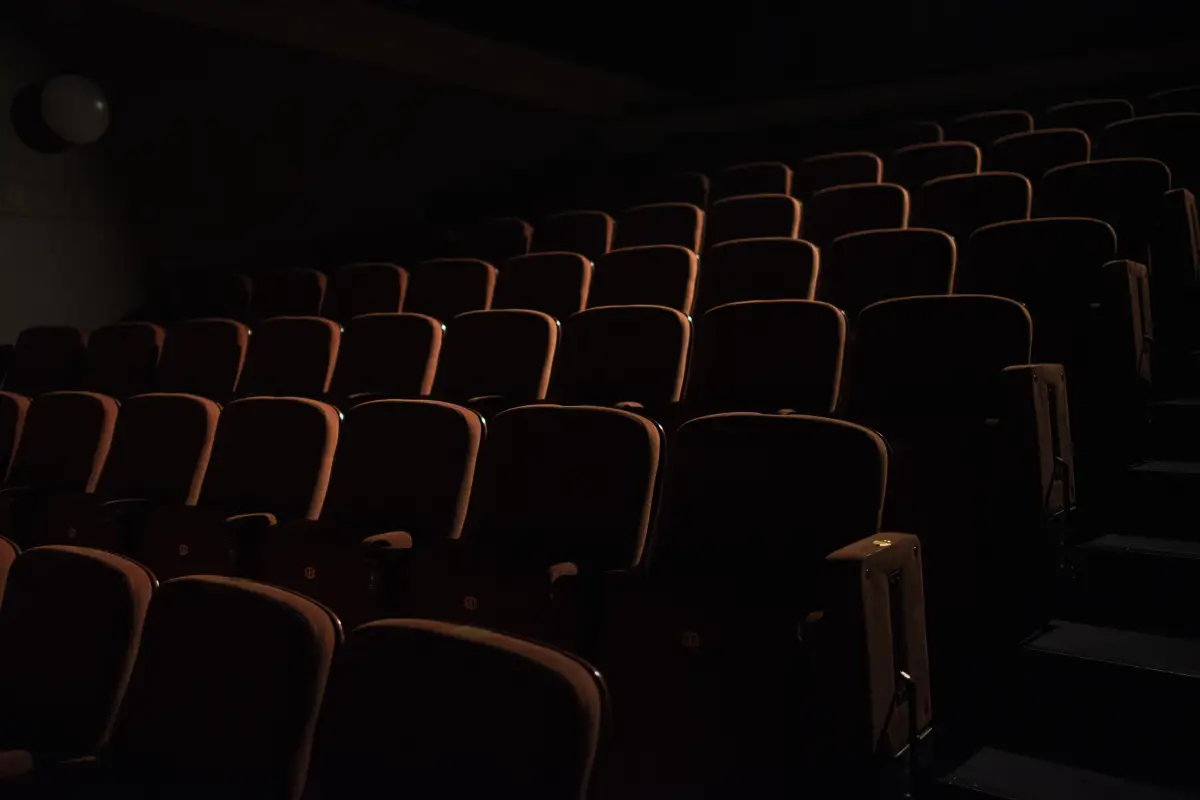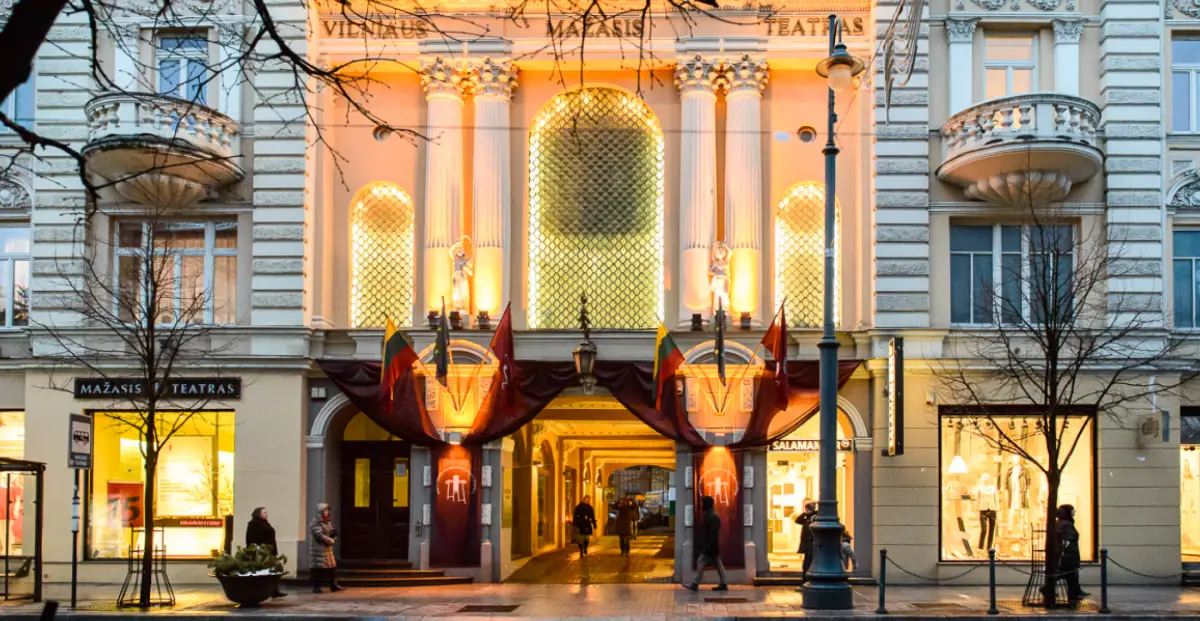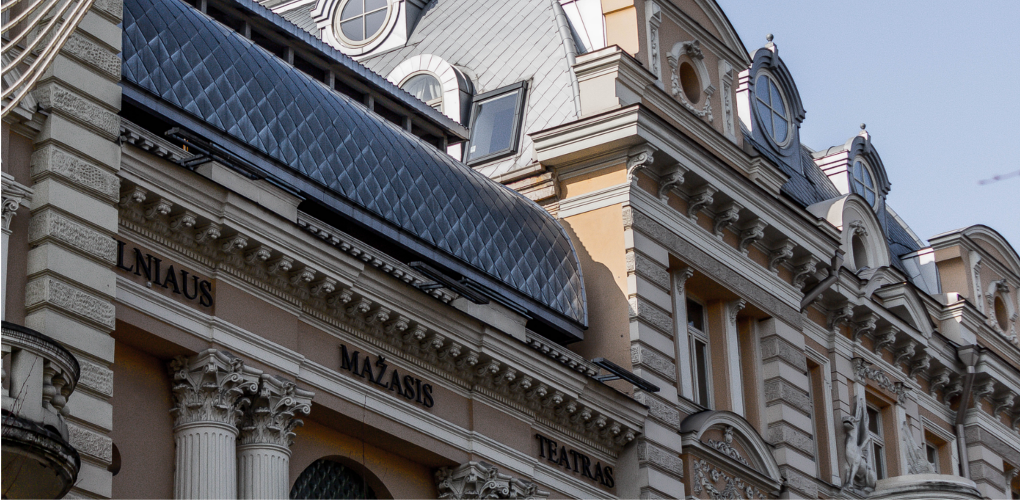
Theater
HISTORY
The Small Theatre of Vilnius was officially founded on March 2, 1990, at the initiative of director Rimas Tuminas, composer Faustas Latėnas and set designer Adomas Jacovskis, however, its beginning is considered to be the performance of "There Will Be No Death Here" (orig. Čia nebus mirties) by V. Kukulas and R. Tuminas, which was shown in the Small Hall of the Lithuanian National Drama Theatre on December 2, 1988. This special work became a symbol of the beginning of the history of the theatre.
In 1997, the Small Theatre of Vilnius gained the status of a state theatre, and since 2005 it has been located in the building at Gedimino ave. 22, which reflects the architectural heritage of Vilnius's Old Town and its colorful national and cultural history. The building was built in 1898-1902 according to the design of the well-known Vilnius architect K. Koroyedov. The theatre troupe was formed by the theatre's founder and long-time artistic director, one of the most famous Lithuanian theatre directors, Rimas Tuminas (1952–2024), and today it is composed of different generations of his own students, continuing the maestro's vision and legacy.
THE COMPANY
The basis of today's company of the State Small Theatre of Vilnius is formed by three generations of actors educated by director and teacher Rimas Tuminas. The actors in the company are considered as representatives of the Tuminas acting school and maintain his ethical and aesthetic heritage.
The company consists of 25 actors.
On January 2025 the composition of the company was as follows (in alphabetical order): Jokūbas Bareikis, Greta Bendžė, Valda Bičkutė, Jonas Braškys, Jūratė Brogaitė, Neringa Būtytė, Mindaugas Capas, Daumantas Ciunis, Arvydas Dapšys, Eglė Gabrėnaitė, Rasa Jakučionytė, Larisa Kalpokaitė, Tomas Kliukas, Ilona Kvietkutė, Balys Latėnas, Gintarė Latvėnaitė, Edmundas Mikulskis, Indrė Patkauskaitė, Vilija Ramanauskaitė, Tomas Rinkūnas, Vytautas Rumšas (junior), Tomas Stirna, Agnė Šataitė, Almantas Šinkūnas, Mantas Vaitiekūnas.
MOST IMPORTANT DATES IN THE HISTORY OF THE STATE VILNIUS SMALL THEATRE:
- On December 2, 1988, the play “There Will Be No Death Here” was performed by R. Tuminas and his company.
- On March 2, 1990, the Small Theatre of Vilnius was founded. Its core consisted of the company: Arvydas Dapšys, Andrius Žebrauskas, Mindaugas Capas, Inga Burneikaitė, Jūratė Brogaitė, Vilija Ramanauskaitė, Almantas Šinkūnas, Eglė Čekuolytė. Later, they were joined by: Eglė Gabrėnaitė, Sigitas Račkys, Jonas Braškys, Arnas Rosenas, Audris Chadaravičius, Larisa Kalpokaitė, Rasa Jakučionytė, Vytautas Šapranauskas, Gediminas Girdvainis, Mykolas Smagurauskas, Edmundas Mikulskis.
- In 1997, the theatre was granted the status of a state theatre.
- In 1999, the theatre was awarded a municipal award for its services to the city of Vilnius – the statue of St. Christopher (appointed in 1998).
- In 2005, it moved into reconstructed premises on Gedimino Avenue.
- In 2005, a documentary film “The Small is returning home” (orig. "Mažasis grįžta namo") was created (dir. V. Damaševičius and J. Matonis), which tells the story of the Small Theatre of Vilnius in a very unique way.
- In May 2024, the cultural space “Rūta” was opened in the basement of the theatre.
- In October 2024, the literary space “Dramateka” was opened near the theatre box office.
- In May 2025, a sculptural composition was unveiled in the foyer of the theatre, dedicated to the memory of the theatre’s founder and long-time artistic director Rimas Tuminas (sculptor – Mindaugas Jankauskas).
REPERTORY
The State Small Theatre of Vilnius is a repertory theatre, in which two dramaturgical directions can be distinguished – classical works and national works. The theatre seeks to discover captivating and interesting solutions to the dramaturgy of the classical form, encourages the search for a unique theatrical language, and also faithfully and carefully nurtures the line of national dramaturgy, does not shy away from a modern look at works of classical Lithuanian prose, adapting them to the theatre stage. When forming the theatre’s repertoire, attention is focused on value-forming literature, the universality of the work, and artistic value. The theatre creates a friendly environment for young theatre artists, allowing them to experiment.
AWARDS & FESTIVALS
(to be added)
"DRAMA TEST RESIDENCY"
“DramaTest Residency” – a competition conceived in 2021 as a response to the pandemic restrictions. Initially called “DramaTest” with the idea that a further perspective – a residency – is foreseen only in the future, in freer times, is currently increasingly starting to take on a clear shape.
Three main goals of this competition can be distinguished. First, to expand the strongly classical dramaturgical line of the State Small Theatre of Vilnius, while also searching for new creative topics, unexpected angles and increasing the audience’s interest in theatre and its forms. Another important direction is working with text. One of the most important landmarks of the project is a closer look at dramaturgy. This opens a great opportunity for textual analysis, experiments, and a comprehensive examination of the potential of the material itself. Finally, the competition opens opportunities for young artists to get involved in creative processes, where the director’s individual thinking and the search for a close relationship with the material are highly valued.
The competition has already become an excellent medium for developing Lithuanian (national) dramaturgy and finding its own theatrical language.
Our aim with this project was not to achieve a form or a finished result, but to encourage the exchange of creative ideas and the growth of young talent. Our goal is to build a long-term bridge to future performances and give them the opportunity to mature.
director Gabrielė Tuminaitė, Artistic director both of SSTV and project “DramaTest (Residency)”
More information: https://vmt.lt/en/drama-test
“DRAMATEKA”
A literary space with a collection of dramaturgical materials and professional literature is located near the theatre box office (Gedimino ave. 22). The idea to create such a place came from the Lithuanian-born author and director Gintare Parulyte, who works abroad. “Dramateka” is open during the theater box office hours. Literature is lent according to established rules.
More information: https://vmt.lt/en/education.
“RŪTA”
A space for alternative culture. “Rūta” periodically organizes “Open Mic” events, in which members of the theatre community actively participate, “Polemic” discussions are held, in which interlocutors are formed on the principle of pro-contra opinions, as well poetry evenings and events of the “Dramokratija” festival are held.
COMMEMORATING THE FOUNDER OF THE THEATRE
The memory of the founder and long-time artistic director of the theater, Rimas Tuminas, is commemorated by a sculptural composition installed in the theatre foyer (sculptor – Mindaugas Jankauskas). The sculptural composition, created in two stages, consists of a cast bell (2005) and a stone pedestal (2025) with carved quotes by R. Tuminas, describing the director’s ethics and aesthetics. Both parts of the sculptural composition respond in different ways to a significant relationship with the history of the building and the theatre, respectively.
HEADS OF THE THEATRE
Mintautas Daulenskis 1990 - 1994
Edvardas Čenkus 1994 - 2000
Faustas Latėnas 2000 - 2005
Rimas Tuminas 2005 - 2010
Greta Cholina 2010 - 2014
Daiva Baltūsytė-Len 2015 - 2020 (2014-2015 acting director)
Simonas Keblas from 2020
PERFORMANCES
R. Tuminas' performances are theatrical, open-form, with elements of improvisation, they develop themes of childhood, home, and theatre, combining a romantic worldview with subtle irony, eccentricity, and the principles of psychological theatre.
Performances directed for the SSTV: "The Cherry Orchard" (1990) by A. Chekhov, "Galileo" (1992) based on the play of B. Brecht, "Smile Upon Us, God" (1994, based on the books by G. Kanovich), "Masquerade" (1997) by M. Lermontov, "The Government Inspector" (2001) by N. Gogol, "Waiting for Godot" (2002) by S. Beckett, "Madagascar" (2004) and "Mistras" (2010) both by M. Ivaškevičius, "Three Sisters" (2005) and "The Seagull" (2009) both by A. Chekhov, "Minetti" (2015) by Th. Bernhard.
The theater's sets and costumes were designed by Virginija Idzelytė, Juozas Statkevičius, Rita Daunoravičienė, Vytautas Narbutas, Simona Biekšaitė, Kotryna Daujotaitė, V. Galeckaitė-Dabkienė, Adomas Jacovskis, Marijus Jacovskis, Aleksandra Jacovskytė, Gintaras Makarevičius, Jolanta Rimkutė, Sandra Straukaitė, Youlian Tabakov, Ramunė Skrebūnaitė, Agnė Kuzmickaitė, Elvita Brazdylytė and others.
The music was created by Faustas Latėnas, Giedrius Puskunigis, Martynas Bialobžeskis, Audrius Balsys, Saulius Mykolaitis, Andrius Šiurys, Antanas Jasenka, Jūra Elena Šedytė, Mantas Mockus and others.
The lighting was designed by Eugenijus Sabaliauskas, Julius Kuršys, Vilius Vilutis, Vaclovas Grinius and others.


